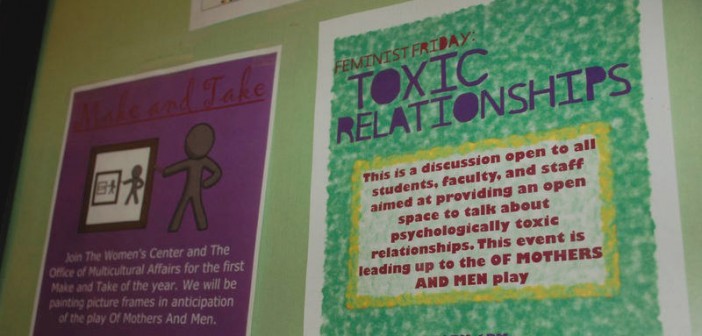“Your partner randomly stops by your job even though you told them that it made you uncomfortable.”
Would you rank this behavior as healthy, unhealthy or abusive?
For the Feminist Friday discussion participants, the answer isn’t straightforward. Students want more background information. They asked a variety of questions as they discussed if this scenario was unhealthy or abusive including: “Why are you uncomfortable?” and “Is your partner coming for lunch, or are they loitering?”
Context is important, noted one student, and the others nodded and murmured in agreement. They eventually arrived at unhealthy.
According to Love is Respect’s website, though, there is no gray area: “Anytime a partner continues to do something after you tell them it makes you uncomfortable, they are being abusive.”
“We were wrong,” said Jessica Ludolph, ’16, leading last week’s Feminist Friday discussion on psychologically toxic relationships. This was the first of many events held by the Women’s Center leading up to the Feb. 25 performance of the play “Of Mothers and Men.”
When people think of relationships, they often think of romantic relationship. But toxic relationships can exist between partners, friends, parents and children, and coworkers.
“It’s not what we classically think of,” Ludolph said.
Rachel McCoog, ’19, said a psychologically-toxic relationship is “something that causes you emotional distress.”
According to Psychology Today, “toxic relationships tend to leave you feeling depressed and depleted.” No relationship is always blissful and conflict-free, but a healthy relationship should “tend to leave you feeling happy and energized.”
Emily Ryan, ’18, said that everyone should have the resources to recognize when a relationship is unhealthy and feel comfortable to speak up.
That’s the goal of Feminist Friday.
“If we can take away the stigma from even just a few people who attend the event, then they can go out and broaden it and the campus can be destigmatized from that issue,” Danielle Schiraldi, ’17, said.
Jean Rymer, ’18, added that even those who don’t speak have the opportunity to listen and learn how to better recognize the signs of toxic relationships.
The signs aren’t always so easy to recognize, though. Many unhealthy behaviors have become normalized, said Rita Jones, director of the Women’s Center. For example, jealousy is often glamorized in the media, particularly in television and movies depicting romantic relationships.
One example is in the popular movie “(500) Days of Summer” starring Joseph Gordon-Levitt and Zooey Deschanel. The main character Tom exhibits some toxic qualities – he is jealous, possessive and demanding, yet his counterpart Summer is portrayed as the one in the wrong. His behavior is justified because he “loves” her, and her non-belief in love is unconventional.
So what makes a relationship toxic? According to the discussion, a toxic relationship is “insecure, demanding, selfish, self-centered, dishonest, untrusting, demeaning and jealous.”
Maybe a relationship that displays only one or two of these qualities isn’t toxic, but as Schiraldi said, “if there are negative feelings, there’s probably something wrong.”
On the other hand, according to the discussion, healthy relationships are “compassionate, secure, safe, sharing, listening, mutual, respectful, and allow for freedom of thinking and healthy debates.”
Relationships operate on give-and-take and require compromise. Rymer said that criticism must be balanced with positive feedback. He used a creative illustration to make his point:
Suppose your friend’s shoe is untied. You could say, “Hey your shoe is untied. You should probably tie it. If you need help I can tie it for you, or I can teach you how to tie your shoe.” That is healthy. The shoe is untied and that’s negative, but you offered a solution.
On the other hand, you could say, “Hey your shoe is untied. You’re a slob and your life is mess.” That would be unhealthy because it’s critical without being constructive or positive.
Maybe it’s an unorthodox example, but the general philosophy is using criticism and positive feedback.
If you or someone you know is involved in a potentially toxic relationship, the Women’s Center, Chaplain’s Office, LUPD, Counseling and Psychological Services, Advocates and the Equal Opportunity Compliance Coordinator/Title IX Coordinator are all resources that can help.






Comment policy
Comments posted to The Brown and White website are reviewed by a moderator before being approved. Incendiary speech or harassing language, including comments targeted at individuals, may be deemed unacceptable and not published. Spam and other soliciting will also be declined.
The Brown and White also reserves the right to not publish entirely anonymous comments.